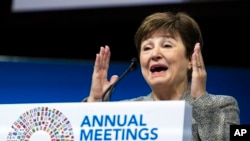The IMF and World Bank Group (WBG) this week are holding annual meetings in Washington, focusing on how to best address global economic disruptions exacerbated by the COVID-19 pandemic, Russia's invasion of Ukraine and climate disasters.
The Resilience and Sustainability Trust with a pledge of nearly $40 billion ''has become operational,'' IMF chief Kristalina Georgieva said in a statement.
Rwanda is the first and only African nation to have reached a deal with the IMF to benefit from the financing instrument, the IMF chief said. Barbados and Costa Rica also have agreements.
Sub-Saharan Africa's growth rate this year dropped to 3.6% from 4.7% in 2021 "due to muted investment and the overall worsening of its balance of trade," according to the IMF.
As parts of the continent grapple with food insecurity due to droughts — particularly in East Africa — and food and energy prices exacerbated by the conflict in Ukraine increase coupled with rising inflation, the IMF chief said funding has also been made available to provide urgent response to African nations.
''For countries suffering from the food crisis, we have expeditiously opened up a window in emergency financing, the Food Shock Window, to provide rapid financing to urgent needs,'' Georgieva said.
Luc Eyraud, a mission chief and advisor in the IMF's Africa Department, told VOA that rising food and energy prices are biting the region's most ''vulnerable'' and that economic activity is expected to ''remain relatively modest in 2023.''
''We had 4.7% of growth in 2021 and we expect 3.6% in 2022. The reason is that the region has been hit by 3 big shocks — a slowdown of the economy [like] the rest of the world, there is a tightening of financing conditions in the region and volatility of commodity prices,'' he said, adding that the situation is a ''problem because it makes access to the international market more difficult for some countries."
Lubinda Haabazoka, director of graduate studies at the University of Zambia, told VOA that despite such laudable initiatives to support African nations, it is imperative to avoid trapping them into more debts.
''African nations should look at how revenues can be generated from mineral resources, so that value is created rather than money borrowed. It is good that long-term financing is going to come, but these financing normally come with almost free capital at predetermined terms. But also these debts are similar to those African nations had and were declared highly indebted poor countries,'' he said.
He suggested that the IMF channel such financing through companies and investors ''so they can create value in member states,'' instead of doling it out to governments.
''I expect to see support for the social sector - help towards supporting poverty alleviation programs, and much emphasis on green growth, and policies aimed at enhancing the agricultural sector in Africa to solve the food crisis,'' Haabazoka added.
The annual meetings in Washington will conclude Sunday.




